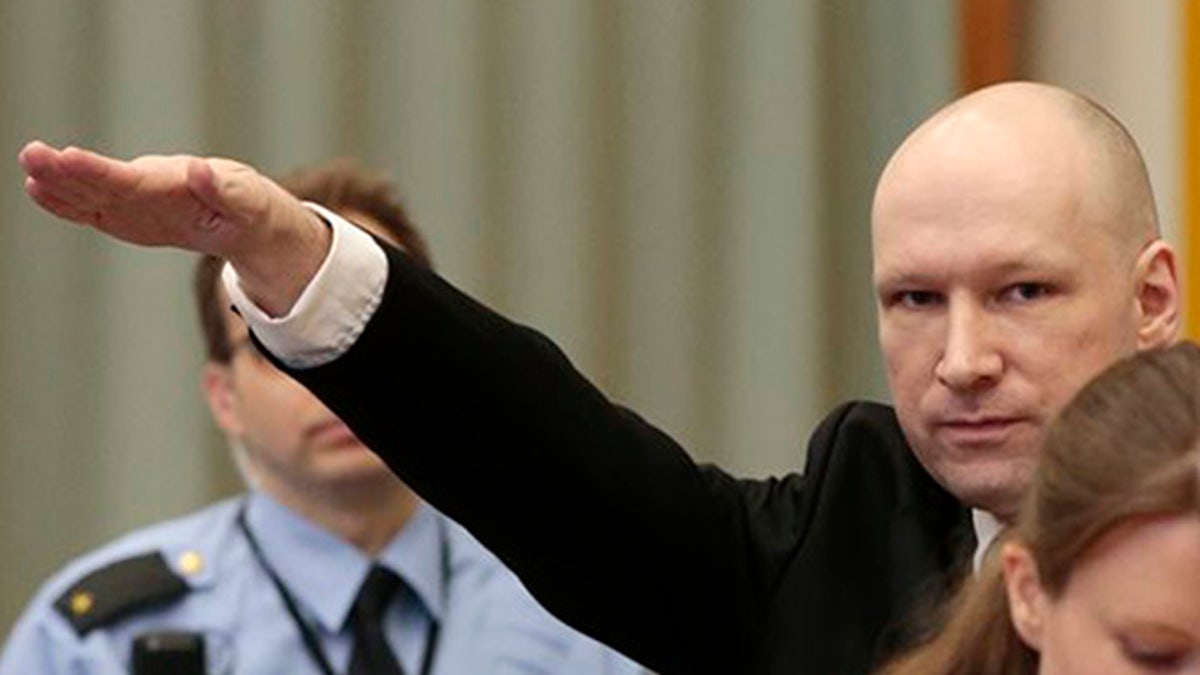
Anders Behring Breivik gestures as he enters a courtroom in Skien, Norway, on Tuesday, March 15, 2016. Breivik, the right-wing extremist who killed 77 people in bomb and gun attacks in 2011 arrived in court on Tuesday for his human rights case against the Norwegian government. (Lise Aserud, NTB scanpix via AP) NORWAY OUT
SKIEN, Norway – Mass killer Anders Behring Breivik kicked off his return to court by making a Nazi salute Tuesday during his bid to improve conditions inside the Norwegian prison where he is being held in isolation for massacring 77 people in bomb-and-gun attacks.
Appearing in the public eye for the first time since his conviction nearly four years ago, the 37-year-old Norwegian and his lawyers are trying to convince a judge that his prison conditions are "inhuman" and violate the European Convention on Human Rights.
The government has rejected his claims, saying he is being treated humanely and with dignity despite the severity of his crimes.
Breivik is the only inmate in a high-security wing of Skien prison, 100 kilometers (60 miles) southwest of Oslo. His mail correspondence is strictly controlled and he's not allowed to communicate with other right-wing extremists. But he has three cells at his disposal, one for sleeping, one for studying and one for working out, and daily access to an exercise yard, authorities said.
In violence that stunned Norway on July 22, 2011, Breivik set off a bomb in Oslo's government district and then carried out a shooting massacre at the summer camp of the left-wing Labor Party's youth organization on Utoya island. He was sentenced to 21 years in prison, the maximum under Norwegian law, but his term can be extended as long as he's considered a danger to society.
Even his lawyer said Tuesday that means Breivik is likely to be imprisoned for the rest of his life.
Lawyer Oystein Storrvik said the goal of the case was to improve Breivik's prison conditions, including allowing to him to interact with other prisoners and removing some restrictions on his mail correspondence.
Government lawyers said of about 4,000 letters written by Breivik or addressed to him, 600 were stopped. They included letters Breivik wrote to right-wing extremists imprisoned in other countries, including members of the Aryan Brotherhood prison gang in the United States.
Government attorney Marius Emberland said prison officials are trying to mitigate Breivik's isolation by having him take part in activities with prison staff such as playing chess. Breivik has declined many of those offers, though he did build a gingerbread house as part of a prison competition, he said.
"The plaintiff has not shown any sign of remorse," Emberland noted in his opening remarks. "Breivik is a very dangerous man."
Norwegian authorities say the restrictions are well within the European Convention of Human Rights and are needed to make sure Breivik isn't able to build militant extremist networks from prison. Still, they stress that Breivik has the same rights as any other inmate to challenge his imprisonment conditions.
"He is a citizen of Norway and even though he is convicted for a horrible crime, he hasn't lost his human rights," said Ina Stromstad, a judge serving as a spokeswoman for the Olso district court.
Breivik is to address the court on Wednesday. Both sides will call witnesses to testify before closing arguments on Friday. The judgment is expected about a month later.
Many survivors and families of victims were trying to ignore this new trial, fearing it could reopen emotional wounds and give Breivik the attention he apparently desires. Still, some watched a retransmission of the proceedings from a courthouse in Oslo.
"It's pathetic. It's a farce," said Lisbeth Royneland, whose 18-year-old daughter, Synne, was killed in Breivik's shooting massacre. She now heads a support group for survivors and the bereaved.
During his criminal trial four years ago, Breivik described himself as a modern-day crusader, fighting to protect Norway and Europe from Muslim immigration. In letters sent to the media from prison, Breivik said he has abandoned his armed struggle and now wants to create a fascist movement while in prison.
